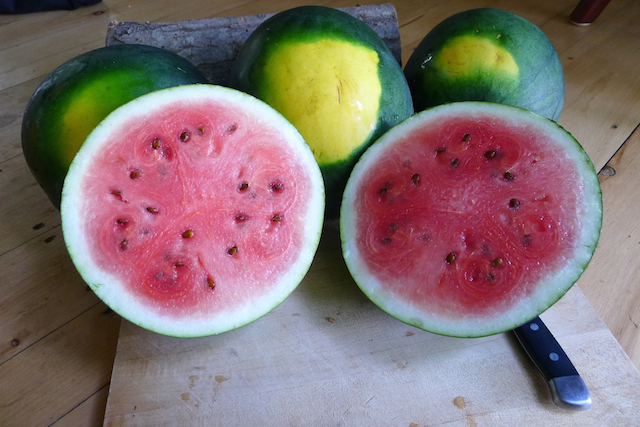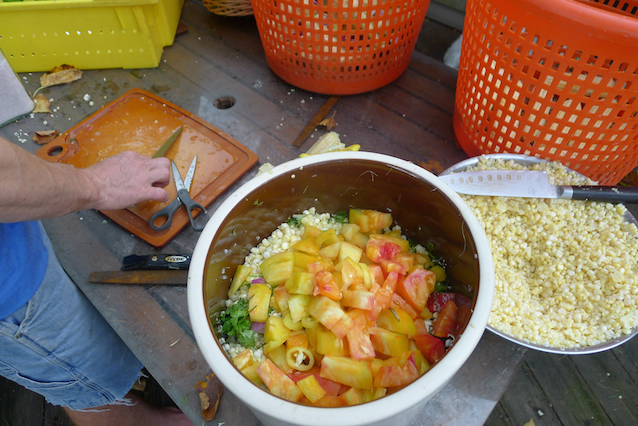
Welcome August: harvest halfway

Sugar Baby watermelon lives up to its sweet name. Wonderfully productive this year, the crop has benefitted from the new landscape fabric mulching system.

We didn't have time to snap many nice farm photos so this is a substitute for an adventure.
News
Notes From The Field
Laboring along the plateau
By Derek McGeehan
Laboring along the plateau
By Derek McGeehan
Today marks the beginning of August and practically the exact middle of our growing season: five months behind us, five months in front of us. In March we began seeding in the greenhouse and come December we'll be harvesting for the Winter Share and wrapping up the season.

A good way to use up surplus summer produce is by making some fermented salsa. This is a treat in the wintertime.
Physically and mentally it feels a bit like the middle of a long, difficult adventure where one reflects on the amount of effort it took to reach this point while realizing the same effort must be made to return home. Waiting at home are the comforts of a well-stocked pantry, refrigerator, freezer, and root cellar to get us through the dark time of year, but first we need to successfully harvest and properly cure and store the healthy produce. Our energy levels wax and wane now, our vision becomes blurry, and we must trudge on, because to stop or slow down means to give up, to not see the great adventure we embarked upon completed. Alas, we must, because we are paid to do so and we want to provide you with the best produce we can grow. We share in the trials and tribulations because we are a community supporting this land and ecosystem on which we depend. We give each other something valuable while sharing in the bounty.

Expected Harvest
Wonderful Watermelon
By Derek McGeehan
Wonderful Watermelon
By Derek McGeehan
Harvest #12 (Week B) should include watermelon, summer crisp lettuce, tomatoes, summer squash, sweet and hot peppers, eggplant, okra, celery, scallions, fresh onions, potatoes, and fresh garlic. Some produce will be a choice. U-pick should include cherry tomatoes, string beans, dill, cilantro, basil, parsley, husk cherries, tomatillos, perennial herbs, and flowers.

Workshifts Over For Season
By Derek McGeehan
By Derek McGeehan
Workshifts have ended for the year. If you weren't able to finish your hours, please send your $15 per missed work hour check made payable to "Anchor Run CSA" as soon as possible (half share - $60, full share - $120). This fills out the balance of your share cost and saves us the need to contact you for payment.

Make the time for U Pick
By Linda Dansbury
By Linda Dansbury
This is the time of year when we spend the most time in the U pick fields. It is a large part of your share, so make sure to plan the time necessary during each of your pick up weeks. At this point and for the next month or so, you will need approximately an hour - some weeks it may be even more. Since it is often hot, make sure you have all that you need: water, sunscreen and/or long sleeves, a hat, bags, clippers or scissors. I have found that if I plan a time increment as part of my week, it is much more relaxing because I can take my time and in between each picking I can stop for a minute or two and enjoy the scenery and the sounds of the farm.

How did I enjoy my harvest?
By Linda Dansbury
By Linda Dansbury
Once again this week I did not cook a lot, but I did use a lot of my share. I have been a member for a long time, so it has become second nature to me to reach in the fridge and grab something from my share to snack on when I am hungry. It almost seems odd during the winter to not be able to do so. I always have a container of hummus, tomato salsa, tomatillo salsa, and/or baba ganoush on hand - some homemade, some purchased. I will reach into the crisper and pull out the kohlrabi, celery, carrots and young summer squash. It is a satisfying and healthy snack or even a meal. I especially do these things on the weekends after I run all my errands and in the evening when I come home from work really hungry. Below are a few things I did make. How did you enjoy your harvest? Please email me at lindadansbury@comcast.net and share with fellow members. Please put Anchor Run in the subject line so I can find your email - I don't want to miss anything!
Lettuce, tomatoes, celery, kohlrabi, scallions, parsley - this time of year, the harvest lends itself to making "vegetable salads", as opposed to lettuce salads. I add some of several things each night - so when it is hot and you don't want to cook but want to enjoy your harvest, you can make a large veggie salad.
Summer squash - made a quadruple batch of Zucchini Bread! This is a great way to use a lot of summer squash - it freezes very well and is so rewarding to take loaves and/or muffins out of the freezer all winter long.
Summer Squash, cherry tomatoes, fresh garlic, basil, parsley - I used my spiralizer and made squash "pasta". I made the strands and salted it and let it hang out for about 15 minutes, then rinsed and squeezed it out. I lightly sautéed garlic in olive oil then added the squash and let it simmer around for just a couple minutes - you don't want it to get mushy. I then added the cherry tomatoes which had been cut in half and turned up the heat a bit and let it all simmer for about 2-3 minutes. The total cooking time for the entire pan was under 10 minutes. I then turned off the heat and added the parsley and basil and served with some grated cheese and a nice hunk of bread to soak up the delicious juices! Yum - I will be doing this again this coming week.
Green beans, scallions, garlic scapes, parsley, sweet peppers - made a large green bean salad - I make mine with an Italian based vinaigrette and I often add chick peas. This week it was served as the side dish for various grilled meats and fish.
Tomatillos, garlic scapes, onion, hot peppers, cilantro - made tomatillo salsa. This salsa can be frozen for future use. I ate some and froze some.
Enjoy the harvest!!

Member ideas and suggestions
By Linda Dansbury
By Linda Dansbury
What do you do when Anchor Run brings you pounds and pounds of summer squash? Janine Lazur sent me a recipe for Summer Squash Pickles. This recipe does not include dill, but if you picked some, I am sure you can add a sprig. This is simple to make and the zucchini "cooks" only in the brine - no canning necessary. Just make a small batch so you can eat it within a week. Thank you Janine!!
Judy Reed had sent me a link for a zucchini bread recipe - I checked it against the one on this site, which is originally from James Beard and it is identical. Thanks Judy!
A fellow member had also put a suggestion on the board at the farm saying not to throw away the celery leaves, which is absolutely true. Throw them in the freezer and then use them later to flavor soups and stews.
Speaking of which, it may be too hot to cook stock right now, but I learned several years ago from a fellow member to save the trimmings from many of the veggies, including onions, carrots, green beans, tomatoes, squash, celery, parsley stems, many of the more mild greens - throw them in a re-sealable bag in the freezer and keep adding to it. Once the bag is full and you are in the mood to make stock, you have all that you need already on hand. Just be careful because using too much of something strong tasting could give the stock an off taste.
Please send your ideas, suggestions, recipes to me at lindadansbury@comcast.net

Recipes
V Summer Squash Pickles
From Food 52.com, but originally from the Zuni Café cookbook. Makes 2-3 pints. Keeps for a week in the refrigerator. Takes approximately 90 minutes to make but much of that is cooling time for the brine.
1 pound zucchini
1 small yellow onion
2 Tablespoons salt, a little more if using kosher
2 cups cider vinegar
1 cup sugar
1 1/2 teaspoons dry mustard
1 1/2 teaspoons crushed yellow and/or brown mustard seeds
1 teaspoon ground turmeric
1 small yellow onion
2 Tablespoons salt, a little more if using kosher
2 cups cider vinegar
1 cup sugar
1 1/2 teaspoons dry mustard
1 1/2 teaspoons crushed yellow and/or brown mustard seeds
1 teaspoon ground turmeric
Wash and trim the zucchini, then slice them lengthwise into 1/16-inch-thick slices on a mandoline. (You could slice them crosswise, too, but Zuni's are lengthwise.) Slice the onion very thinly as well. Combine the zucchini and onions in a large but shallow non-reactive bowl or casserole dish, add the salt, and toss to distribute. Add a few ice cubes and cold water to cover, then stir to dissolve the salt. After about 1 hour, taste and feel a piece of zucchini—it should be slightly softened. Drain and pat dry. Meanwhile, combine the vinegar, sugar, dry mustard, mustard seeds, and turmeric in a small saucepan and simmer for 3 minutes. Set aside until just warm to the touch. If the brine is too hot, it will cook the vegetables and make the pickles soft instead of crisp. Transfer the zucchini and onion pieces to three two-cup canning vessels (or the equivalent) and pour over the cooled brine. Seal tightly and refrigerate for at least a day before serving to allow the flavors to mellow and permeate the zucchini.


